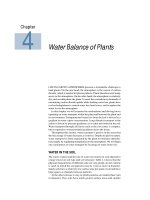- Trang chủ >>
- Đề thi >>
- Đề thi tuyển dụng
Water Expressions
Bạn đang xem bản rút gọn của tài liệu. Xem và tải ngay bản đầy đủ của tài liệu tại đây (75.65 KB, 2 trang )
<span class='text_page_counter'>(1)</span>Words and Their Stories: Water Expressions Keeping your head above the water | WORDS AND THEIR STORIES . Print. . Comment. . Share:. Water expressions are almost as common as water itself. . MULTIMEDIA . Play or download MP3 of this story Words and Their Stories: Water Expressions Listen. o. Playlist. o TEXT SIZE. 03/22/2013. Now, the VOA Special English program WORDS ANDTHEIR STORIES. Expressions about water are almost as common aswater itself. But many of the expressions using waterhave unpleasant meanings. The expression ”to be in hot water” is one of them. It is a very old expression. “Hot water” was used fivehundred years ago to mean being in trouble. One storysays it got that meaning from the custom of throwingextremely hot water down on enemies attacking acastle. That no longer happens. But we still get in “hot water.” When we are in “hotwater,” we are in trouble. It can be any kind of trouble -- serious or not soserious. A person who breaks a law can be in hot water with the police..
<span class='text_page_counter'>(2)</span> Ayoung boy can be in hot water with his mother, if he walks in the house withdirty shoes. Being in “deep water” is almost the same as being in hot water. When youare in deep water, you are in a difficult position. Imagine a person who cannotswim being thrown in water over his head. You are in deep water when you are facing a problem that you do not have theability to solve. The problem is too deep. You can be in deep water, forexample, if you invest in stocks without knowing anything about the stockmarket. “To keep your head above water” is a colorful expression that meansstaying out of debt. A company seeks to keep its head above water duringeconomic hard times. A man who loses his job tries to keep his head abovewater until he finds a new job. “Water over the dam” is another expression about a past event. It issomething that is finished. It cannot be changed. The expression comes from the idea that water that has flowed over a dam cannot be brought back again. When a friend is troubled by a mistake she has made, you might tell her toforget about it. You say it is water over the dam. Another common expression, “to hold water,” is about the strength orweakness of an idea or opinion that you may be arguing about. It probablycomes from a way of testing the condition of a container. If it can hold water, it is strong and has no holes in it. If your argument can hold water, it is strong and does not have any holes. If itdoes not hold water, then it is weak and not worth debating. “Throwing cold water” also is an expression that deals with ideas orproposals. It means to not like an idea. For example, you want to buy a newcar because the old one has some problems. But your wife “throws coldwater” on the idea because she says a new car costs too much..
<span class='text_page_counter'>(3)</span>









